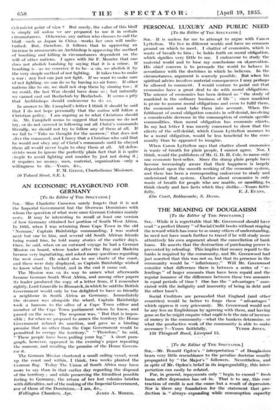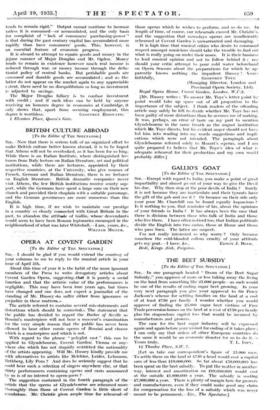- [To the Editor of TIIE SPECTATOR.] .
Sia,—Mr. Ronald Ogden's ." interpretation of Douglasism bears very little resemblance to the peculiar doctrine usually propagated by " the Major's followers. Nevertheless, and in spite of Mr. Ogden's belief in -its impregnability, this inter- pretation can easily be refuted.
For, in general, repayments only " begin to exceed " fresh loans after depression• has set. in. That is to say,-this con- traction of credit is not the cause-but .a result of depression. Nor is there• any foundation. for• the statement that _pro- duction is . always,expaiuding while consumption capacity, tends to remain- rigid."' Ootput cannot to increase unless it is consumed—or accumulated, and the only basis for complaint of " lack of consumers' purchasing-power " is that during the past century capital has aecuinulated more rapidly than have consumers' goods'. This; however,' is an essential feature of economic progtess.
It is absurd to attempt to equate goods and money in the jejune manner of Major :Doughii and Mr. Ogden.' Money tends to remain in existence however much real income is reduced through war, or money income through the defla- tionist policy of central banks. But perishable goods are consumed and durable goods are accumulated ; and as the latter do not appear on the market again to any appreciable extent, there.need be no disequilibrium so long as investment
adjusted to savings.
The Major Douglas fallacy is 'to confuse investment with credit ; and if such ideas can be held by anyone receiving an honours degree in economies at Cambridge, it only shows that, apart from securing employment, this
degree is Worthless:• - GEOFFREY BIDDULP11.- 1 EIrcthton Place, Queen's Gate.







































 Previous page
Previous page